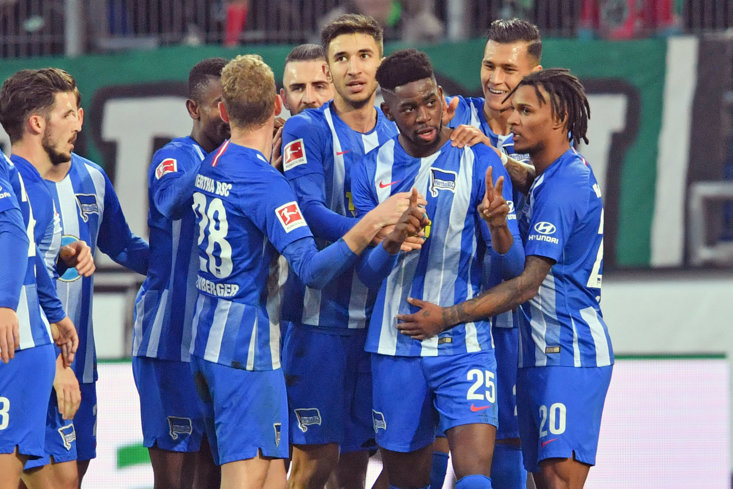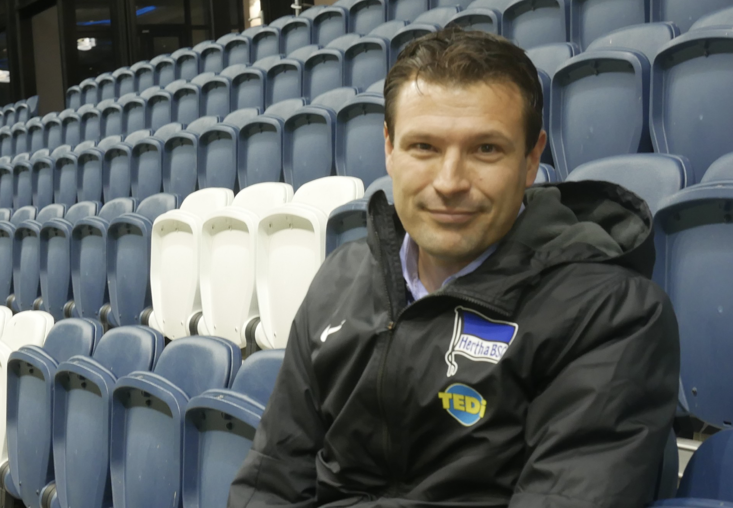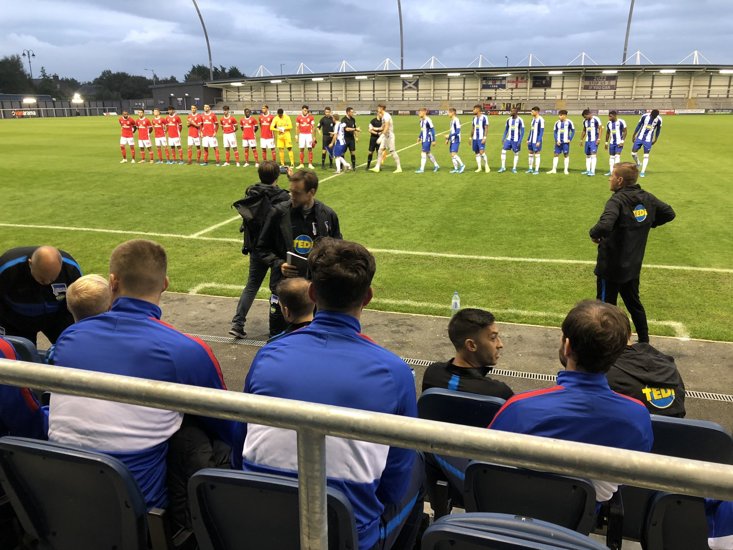The Premier League might boast seemingly never-ending riches and superstar players, but it is in Germany where the real action is happening on the field.
The Bundesliga could be in for a massive shake-up this season after seven years of Bayern Munich dominance, with just two points dividing the top nine clubs.
Hertha Berlin have not been champions since 1931 but are positioned neatly on the tail of the chasing pack just five points off the summit. Their early-season form comes thanks in part to the focus they have placed on nurturing young local talent for the challenge of first-team football.
Benjamin Weber is key to that growth. The Hertha academy manager is overseeing the development of the next crop of youngsters who will ideally make names for themselves in the capital club’s first team.
As part of that journey, he is bringing them to the UK to participate in the Premier League International Cup, an under-23s event which sees 12 continental clubs come up against a dozen English sides.
“See, this is why this tournament is important,” Weber tells The Sportsman in a candid pitchside interview during their 2-1 defeat to Benfica in their opening fixture at AFC Fylde’s Mill Farm stadium. “We have just conceded a penalty but we have to keep playing and competing. It is so important for the development of our players, to reach a professional level.”
Nurturing young local talent, Hertha Berlin’s aim is to bring players from the area onto the Olympiastadion pitch. It’s about having a connection. At this level, results are not so important to Weber and his team. ‘We try, we fail, we win’ is the mantra.
“It’s not about winning tournaments for the youth. In these competitions it's nice to win and to educate but it’s more about the players, because the goal is to bring one or two into the first-team.”
They are delivering. Nearly 70 graduates have played first-team football since the academy was established in 2001. Jordan Torunarigha has already made more than 30 Bundesliga appearances at 22. Having featured against Bayern Munich and Borussia Dortmund last season, he has a big future and the club has serious faith in him.
Maximilian Mittelstädt, born in the German capital, has impressed this season and has represented the national team at Under-21 level. Palko Dardai, son of former Hertha coach Pal Dardai, is also in the squad and another born in Berlin.

“Working with the youth is one of the most important building blocks of the DNA of the club,” Weber explains.
“This is what we’re working towards in the academy, that we bring the players to the first team. Currently about 13 players from the youth academy programme are in the main squad, three are in the starting team.
“We are a development club. The play is flexible and we are confident to play.
“Players won’t be pressed into one system. We educate them in playing football, not only in the high press like RB Leipzig but being able to play different systems.
“That's our DNA, to have flexible players who can adapt to different styles of play and situations on the pitch, who can identify with the club.”
Identifying with Hertha is crucial to this model. Current first-team coach Ante Covic spent more than a decade playing for the club over two spells, before managing the reserves for six years ahead of taking the reins of the main team.
His replacement Andreas Neuendorf is also a local, and spent 12 years representing the club as a player.
On his way to his seat, Weber high-fives every player on the bench. Having been with the club for 17 years, he arrived to do some educational work having studied sports science and economics and is now in charge of guiding the next crop of Hertha youngsters.
Always instructing, always shouting encouragement, the backroom staff are a seriously vocal bunch as we sit and watch the game unfold.
While the vast majority of players are from the German city, Weber admits that recruitment is still vitally important.
Karim Rekik arrived from Marseille at the age of 20 having started his career with Manchester City. Another Etihad graduate Javairô Dilrosun arrived in 2018 and has made 22 appearances.
As we speak and watch the match unfold, Weber points out to the field: “Only one is not from the area of Berlin. Only Daishawn Redan, we bought him from Chelsea, all of the other players come from the area of Berlin and the inner area.
“This is the way, we will look for young players who have the potential to develop at the highest level from other sides
“There are interesting young players who can be developed for more, from the ages of 18 or 19 and what we can offer is playing time in the Bundesliga.”

#BSCSLB #DieZukunftGehörtBerlin #hahohe
This is key and is what has enticed so many English youngsters to try their luck in Germany. At a time when the Premier League is saturated with big-money buys, the route to first-team stardom is much easier in the Bundesliga.
Just ask Jadon Sancho. Born in south London, he turned down the chance to stay at Manchester City and moved to Borussia Dortmund. He’s now one of the most feared wingers in the world, playing Champions League football and pushing Bayern close for the domestic title.
Elsewhere, Jonjoe Kenny scooped ‘Rookie of the Month’ in September after joining Schalke on loan from Everton while Ademola Lookman also left Goodison for Germany to sign permanently for Leipzig.
West Ham prospect Reece Oxford swapped east London for Augsburg, and Chelsea’s midfield duo Ethan Ampadu and Lewis Baker are at Leipzig and Fortuna Dusseldorf respectively, on loan.
So, is Weber surprised by the British invasion of the last few seasons?
“No,” is the instant answer. “They are well educated but what we can offer is playing time, playing time they maybe didn’t get in the Premier League.
“The Bundesliga is a really good league for players to develop.
“You can compete in good conditions, with intensity, and the best thing is real playing time on good pitches. The most important thing for a player is to play.”
For so long, Germany appeared to be leading the way when it came to youth football. After lifting the World Cup in 2014, the narrative grew and this footballing nation supposedly had everything right when it came to development.
But when they were dumped out of the 2018 tournament, the story changed.
“It wasn’t ‘all good’ when we won the World Cup in 2014 and everything wasn’t really bad in 2018,” Weber insists. “But it’s like this sometimes and other countries develop as well.”
“At the moment, we have some really top players in Germany but we don’t have the masses of players like England, for example. That’s why in youth football you sometimes have age groups that are better than others.”

So, while success may come down to timing in the main, Weber is sure about one thing - tournaments such as the Premier League International Cup are crucial for a player’s development.
“In German football, we don’t have such a competition like the Premier League to organise a tournament for youth development, for youths to compete at the highest level,” he says.
“This is what German football needs to do as well for players coming up from the youth programme to the first teams. Rather than just playing third division men’s teams, we are playing Benfica, Newcastle and Blackburn in this year’s group stage.
“It’s very important because you can compete on a very high level and bring the players forward.
“For this competition, you have to travel, you have to train, you have to wake up early in the morning and you have to perform in the evening.
“The surroundings, the training pitch, the competition, how it’s organised, we are very thankful to be part of the competition for the last four years. Thirteen players who’ve played this competition are now playing in the German Bundesliga.”
Hertha’s dedication to their young players should see them reaping the rewards for years to come and the conveyor belt of Berlin talent shows no signs of slowing.
